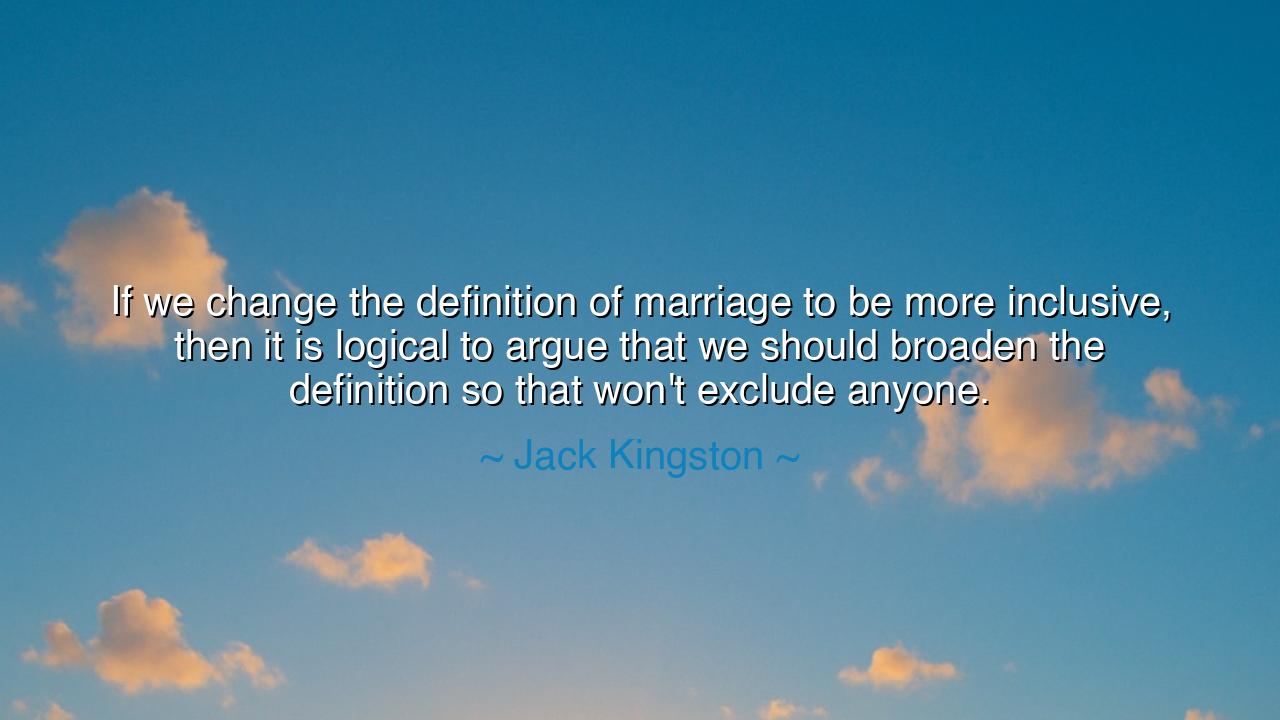
If we change the definition of marriage to be more inclusive
If we change the definition of marriage to be more inclusive, then it is logical to argue that we should broaden the definition so that won't exclude anyone.






In the wisdom of the ancients, we are reminded time and again that the true essence of justice and equality lies not in rigid definitions, but in the flexibility to embrace the changing tides of human connection. The words of Jack Kingston—"If we change the definition of marriage to be more inclusive, then it is logical to argue that we should broaden the definition so that it won't exclude anyone"—echo with the timeless truth that the definition of sacred bonds, of unions, is not something written in stone, but something that must grow and evolve with the needs of the people.
At its core, marriage has always been a symbol of union, not just of two bodies, but of hearts and souls bound together by love and commitment. From the earliest days of human civilization, marriage was seen as a sacred and transformative partnership, a way for individuals to come together and build something greater than themselves. The ancient Greeks, in their philosophical musings, understood that love could take many forms, and the union between people was not a one-size-fits-all institution. The bond was always meant to reflect the needs and values of society. So, if marriage is to be the foundation of a community, then it must be adaptable, able to expand its definition to meet the growing diversity of human relationships.
Consider the story of Socrates and his reflections on the nature of the soul and relationships. Though his personal life might be seen as unconventional by today’s standards, Socrates believed deeply in the importance of human connection, in whatever form it may take. His relationship with Xanthippe, though often characterized as one of tension, was ultimately grounded in the idea that marriage is a place of growth—a space where individuals come together, not to limit each other, but to support and challenge one another in the pursuit of truth. If marriage, as Socrates saw it, is a place for the growth of the soul, then it follows that love and commitment should not be constrained by narrow definitions.
Similarly, throughout history, as civilizations evolved, the definition of marriage evolved with it. The ancient Romans, who embraced a more flexible view of marriage and union, practiced forms of partnership that were not based on the narrow idea of romantic love, but on mutual respect, companionship, and social utility. These evolving views of marriage did not diminish the sanctity of the union, but rather, they enriched the very concept, making it relevant to the needs and desires of the individuals involved. In the same way, today, if we expand the definition of marriage, it does not undermine its value, but rather reflects our growth as a society that recognizes the diverse ways in which people connect, love, and commit to one another.
The great lesson of Kingston’s words is this: when we choose to broaden the definition of marriage, we are not simply altering an ancient institution for the sake of convenience or trend. We are acknowledging the truth that love, commitment, and union come in many forms and should not be restricted by arbitrary boundaries. By expanding the definition, we honor the dignity of all individuals, recognizing that no one—regardless of their gender, identity, or relationship style—should be excluded from the right to express love and commitment in a way that is meaningful to them.
As we walk through life, let us not cling to outdated notions that serve to exclude others from experiencing the same joys and commitments that we hold dear. Let us remember that the sacredness of marriage lies not in its exclusivity, but in its ability to unite souls, to offer security and support, and to celebrate the deep human need for connection. Whether you are entering into a union with a partner of the opposite sex, the same sex, or some other form of partnership, remember that the true meaning of marriage is not found in the definition, but in the love, respect, and commitment that underpins it.
Take this wisdom into your own life: challenge the notions that seek to divide and restrict, and instead embrace a broader, more inclusive understanding of the relationships that matter most. Let your actions reflect the truth that love cannot be limited by any definition, and that marriage, in its purest form, is a celebration of unity in all its diverse expressions. The world is changing, and as it does, we must evolve alongside it, understanding that a more inclusive future is not one that diminishes the past, but one that builds upon it, making it stronger and more reflective of the full breadth of human experience. Expand the definition of marriage not to destroy its meaning, but to enhance it for all who seek to love and be loved.






AAdministratorAdministrator
Welcome, honored guests. Please leave a comment, we will respond soon